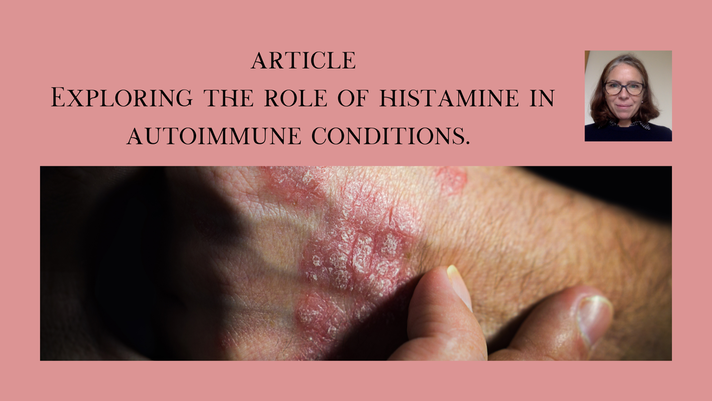ARTICLE Categories
All
|
|
When you think of histamine, you don’t always correlate it with autoimmune conditions, even if you know that those illnesses are all about the immune system and inflammation which is driven by histamine.
Today’s article, the third in my ‘histamine’ series, focuses on autoimmune conditions, and the article includes information on:
Histamine’s involvement in autoimmune conditions Autoimmune conditions are a diverse group of illnesses, which all involve a person’s own immune system mistaking its own tissues as a foreign invader, triggering an immune response, inflammation and ultimately tissue damage. There are a whole host of different autoimmune conditions, affecting diverse parts of the body, including Type 1 Diabetes, rheumatoid arthritis, psoriasis, Inflammatory Bowel Disease and Multiple Sclerosis, amongst many others. As an aside, many people mistakenly think that eczema/dermatitis is also an autoimmune condition, but whilst the immune response is involved, it doesn’t actively attack the skin. The precise causes of autoimmune diseases are complex, multifactorial, immunological, and often genetic. Recent research has highlighted histamine’s role in the development and exacerbation of autoimmune conditions (1) and whilst it can’t be blamed solely for triggering autoimmunity, it can act as a catalyst, amplifying immune responses and promoting the inflammation which subsequently leads to tissue damage. For those who are histamine intolerant, have disruptions in the genetic pathways for the breakdown and removal of histamine, or who may be experiencing a temporary high histamine load, the accumulation of histamine in the bloodstream can trigger a range of symptoms such as headaches, hives, digestive issues and may also exacerbate autoimmune condition specific symptoms. Research has even pointed to histamine intolerance as being linked to autoimmune conditions onset due to the constant low-grade inflammation triggered by the molecule’s presence. Long-term exposure to histamine may lead to an over-stimulated immune system, which can lead to dysfunction and reactivity. (1–3) Histamine can stimulate the production of pro-inflammatory cytokines, signalling molecules that promote inflammation. In some cases cytokine production can become excessive, leading to the chronic inflammation so characteristic of autoimmune conditions. (4,5). This can also lead to a condition called Mast Cell Activation Syndrome, that I will address in a future article. Histamine and the gut/immune axis The gut plays an important role in the immune system and recent research has highlighted histamine’s role in influencing this axis along with modulating dysbiosis and the health of the gut wall (leaky gut). (6) See my previous article for further detail. Which are the autoimmune conditions that are most likely to involve a strong histamine response. Whilst histamine is involved in all autoimmune conditions to one extent or another, there are some conditions that are particularly histamine related, these include:
My top tips for managing histamine in relation to autoimmune conditions.
If on medication, please speak to your GP/consultant before making any changes to your diet. If you are interested in histamine and its impact on symptoms, this article is the second in a series I am currently publishing covering. The series in total will include:
Sign up for my news to receive the published articles straight to your inbox. Read more by clicking below to see my previously published articles:
I’m Jessica Fonteneau, the Eczema and Digestive Health Nutrition Expert. I’ve worked with hundreds of clients to help them change their diets, better manage their flares, and find relief. My vocation is to help those with eczema and digestive issues, because I have suffered with these interlinked conditions since I was 6 months old, and I truly know what it is like to experience these debilitating conditions. Every client I have ever worked with has their own triggers and ideal nutrition. There is no such thing as ‘one-size-fits-all’. Whether you work with me one-to-one or use my guided tools, my objective is to help you uncover what works best for you, so that you take back control and experience relief. My guided programmes are only suitable for adults as children have very specific nutrition requirements. I do, however, work with many child clients as part of my clinic. I also offer two free communities for adults caring for children with eczema and digestive symptoms, feel free to come and join us and get some well-deserved support.
To easily keep up with my articles, masterclasses, ebooks and online programmes and receive exclusive access to early bird offers, sign-up to my newsletter. Interested in what I do and who I am? Go to my website: www.jessicafonteneaunutrition.com References:
0 Comments
Leave a Reply. |
AuthorI’m Jessica Fonteneau, I’m the eczema specialist and I help people Escape from the Eczema trap. Archives
April 2024
Catégories
All
|


 RSS Feed
RSS Feed